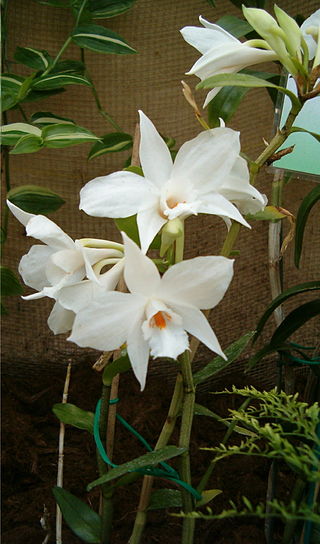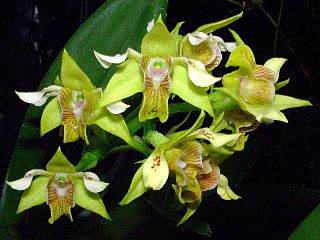
Dendrobium is a genus of mostly epiphytic and lithophytic orchids in the family Orchidaceae. It is a very large genus, containing more than 1,800 species that are found in diverse habitats throughout much of south, east and southeast Asia, including China, Japan, India, the Philippines, Indonesia, Australia, New Guinea, Vietnam and many of the islands of the Pacific. Orchids in this genus have roots that creep over the surface of trees or rocks, rarely having their roots in soil. Up to six leaves develop in a tuft at the tip of a shoot and from one to a large number of flowers are arranged along an unbranched flowering stem. Several attempts have been made to separate Dendrobium into smaller genera, but most have not been accepted by the World Checklist of Selected Plant Families.

Dendrobium crumenatum, commonly called pigeon orchid, or 木石斛 is an epiphytic orchid in the family Orchidaceae and is native to Asia, Southeast Asia, New Guinea and Christmas Island. It has two rows on leaves along its pseudobulb and relatively large but short-lived, strongly scented white flowers. It usually grows in exposed positions in lowland rainforest and coastal scrub.

Johannes Jacobus Smith was a Dutch botanist who, between years 1905 to 1924, crossed the islands of the Dutch East Indies, collecting specimens of plants and describing and cataloguing the flora of these islands. The standard botanical author abbreviation J.J.Sm. is applied to plants described by J.J. Smith.

Dendrobium speciosum, commonly known as the rock orchid or cane orchid, is a species of highly variable Australian orchid. Its varieties can be found in a range of habitats as epiphytes or lithophytes. It has a continuous distribution along the east coast of Australia and in distinct populations along the Tropic of Capricorn. As a lithophyte, it forms gigantic spreading colonies on rocks and cliff faces, often exposed to full sun, with its roots forming dense, matted beds across the rock that anchor the plant. It can be found at altitudes from sea level to 900 metres (3,000 ft).

Dendrobium nobile, commonly known as the noble dendrobium, is a member of the family Orchidaceae. Dendrobium nobile is one of the most widespread ornamental members of the orchid family. It is the state flower of Sikkim.

Dendrobium amabile is a species of orchid endemic to Vietnam.

Dendrobium anosmum, commonly known as the unscented dendrobium, is a species of epiphytic orchid with large purple flowers. It is widespread across Southeast Asia from Sri Lanka to New Guinea, including Indochina, Indonesia, the Philippines, etc. Despite its common name and scientific name, D. anosmum usually has a strong fragrance reminiscent of raspberries.

Dendrobium bigibbum, commonly known as the Cooktown orchid or mauve butterfly orchid, is an epiphytic or lithophytic orchid in the family Orchidaceae. It has cylindrical pseudobulbs, each with between three and five green or purplish leaves and arching flowering stems with up to twenty, usually lilac-purple flowers. It occurs in tropical North Queensland, Australia and New Guinea.

Dendrobium chrysotoxum is a widely cultivated species of orchid. It is native to Southeast Asia, growing naturally in Myanmar, Bhutan, Yunnan, China, Manipur, Assam, India, Bangladesh, Andaman Islands, Laos, Nepal, Thailand, and Vietnam.

Dendrobium crepidatum is a species of orchid. It is native to southern China, the eastern Himalayas, and northern Indochina.

Dendrobium gracilicaule, commonly known as the blotched cane orchid or yellow cane orchid, is an epiphytic or lithophytic orchid in the family Orchidaceae. It has cylindrical pseudobulbs, between three and seven thin leaves and up to thirty often drooping, cream-coloured to yellow or greenish flowers, sometimes with reddish brown blotches on the back. There are two varieties, one occurring in Queensland and New South Wales and the other on some Pacific Islands, including Lord Howe Island.

Dendrobium infundibulum, the small-funnel-lipped dendrobium, is a species of orchid. It is native to northern Indochina and to neighboring parts of China and India .

Dendrobium jenkinsii, the Jenkins's dendrobium, is a species of orchid. It is native to southern China (Yunnan), the eastern Himalayas and northern Indochina.

Dendrobium macrophyllum, commonly known as the large-leaved dendrobium or pastor's orchid, is a species of Orchid.

Dendrobium moniliforme, known as Shihu in Chinese and Sekkoku in Japanese, is a species of orchid. It is native to Japan, Korea, China, the Himalayas, and northern Indochina.

Dendrobium moschatum, the musky-smelling dendrobium, is a species of orchid. It is native to the Himalayas, and Indochina.

Dendrobium pulchellum is an orchid is native to Southeast Asia. This stunning plant blooms from the completion of winter into early spring. This is due to Dendrobium requiring cooler temperatures for growth and development.

Dendrobium thyrsiflorum is a species of orchid, commonly called the pinecone-like raceme dendrobium. It is native to the Himalayas as well as to the mountains of northern Indochina.

Dendrobieae is a tribe in the subfamily Epidendroideae, in the family Orchidaceae. The Dendrobieae are mostly tropical, epiphytic orchids which contain pseudobulbs.



















